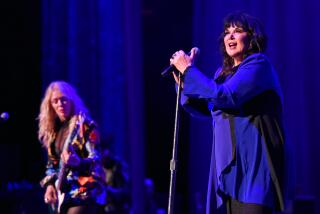Rhythmic Gumbo : Some of the Neville Brothers’ famous fans are helping the New Orleans band get a taste of success at last
- Share via
For the 13 years they’ve been together as a band, New Orleans’ Neville Brothers have been perhaps the greatest anomaly in the music biz.
Brothers Art, Aaron, Charles and Cyril are some of the most respected musicians around, counting the Rolling Stones, Huey Lewis, Robert Palmer, Robert Plant, Herbie Hancock, Elvis Costello, a slew of critics and even “60 Minutes” co-anchor Ed Bradley among their fans. But to the public at large, the Nevilles have also remained some of the most unknown musicians extant, lacking radio play, or even a record contract for much of their career.
It’s not that the band’s mix of R&B;, funk, jazz, reggae and African music has any trouble moving masses of people when they get a chance to hear it: The Nevilles annually get crowds of 50,000 dancing during their customary closing spot at the New Orleans Jazz and Heritage Festival, and they were no less propulsive on the road with 1987’s Amnesty International “Conspiracy of Hope” tour, sharing the stage with U2, Sting and Peter Gabriel. (The Nevilles will play the Coach House in San Juan Capistrano today.)
“It is kind of frustrating,” saxophonist/percussionist Charles Neville explained from a tour stop in Santa Barbara this week. “Because what we do is different, it’s been a problem for radio programmers and record companies to figure out how to categorize us. . . . I think they may figure out that for what we are and what we do it’s cool to play us and let the fans figure out what to call it.”
Several of the band’s famous fans are working to make sure that the Nevilles’ time has come. Daniel Lanois, producer of U2’s Grammy-winning “The Joshua Tree” and discs by Peter Gabriel and Robbie Robertson, made a special project of helming the group’s new album. Due out March 15, “Yellow Moon” is already being vigorously promoted by A&M; Records. Jonathan Demme (“Married to the Mob,” “Stop Making Sense”) directed the video to the debut single, “Sister Rosa.”
Additionally, a Cinemax special airing in May, “The Neville Brothers ‘Tell It Like It Is,’ ” will feature John Hiatt, Dennis Quaid, Jimmy Buffett, Bonnie Raitt and others, including “60 Minutes’ ” Bradley singing “60 Minute Man” with the band.
Bradley will also be seen helping perform “Sister Rosa,” a rap-reggae tribute to civil-rights pioneer Rosa Parks, whose insistence on her right to a “whites only” bus seat in Birmingham, Ala., in 1955 instigated the first confrontation of the then-fledgling movement.
“From talking to kids, Cyril (who wrote the song with former Nevilles bassist Darryl Johnson) found that the kids didn’t know very much about Afro-American history and had trouble remembering things they had learned in school, but didn’t have trouble remembering all the words to a rap song,” Neville said. “So (we) figured if we give them the information in that format, they’ll take it in and remember it.”
“Sister Rosa” has plenty of socially conscious company on “Yellow Moon.” In addition to band originals dealing with nuclear destruction and with suffering from South Africa to America’s Indian reservations, there’s a moving Aaron Neville reading of Sam Cooke’s 1965 “A Change Is Gonna Come” and two early Bob Dylan broadsides, “With God on Our Side” and “The Ballad of Hollis Brown.”
Neville said, “We feel part of our job is in raising people’s awareness and letting them know that we as artists are aware of conditions in the world and are concerned about them. . . . We’re trying to help spread the idea that everyone can contribute to the change.”
Toward that end, the brothers’ activities have ranged from involvement in a neighborhood youth center in New Orleans to contributing their services to the 1987 Amnesty International tour, not the easiest investment of time and effort for a struggling band.
“I think it just comes from all our experiences in life, the fact that we’ve been around since World War II (Charles is 50, Aaron is 48, Art is 51 and Cyril is 40) and have been performing since the ‘50s, and we’ve seen conditions in the world go through some pretty big changes, for better and worse. One of the biggest things was how in the ‘60s, people became more aware and desired to be more involved in determining what was happening with our lives. During the period afterward when that awareness went down, conditions got worse. Now it’s absolutely necessary to have that awareness and concern,” Neville said.
The family’s musical history stretches back to the mid-1950s when Art and his band the Hawkettes recorded the classic “Mardi Gras Mambo” about the same time Elvis Presley was discovering rockabilly in Memphis. Aaron’s breathtakingly melismatic voice first gained national attention on “Tell It Like It Is” in 1966, while Charles played with B. B. King, Bobby (Blue) Bland, Percy Mayfield, Stanley Turrentine and others. Art formed the ace studio band the Meters, sort of the New Orleans equivalent to Booker T. and the MGs, with Cyril joining up in the ‘70s.
The four came together in 1976 to provide backing for the now-legendary “The Wild Tchoupitoulas” album, a remarkable documentation of the “Mardi Gras Indian Tribe” (a Louisiana African-American cultural tradition dating back to slavery) led by their uncle George (Big Chief Jolly) Landry. The brothers have continued together since then, remarkably free, Neville said, of the rivalries that mark other siblings.
“We’d already gone our separate ways for many years. Then, working with George Landry, he reminded us that our parents had always wanted to see us work together. And when we came together to do that music, it all flowed together so smoothly and so easily and so freely, it genuinely amazed us. It was almost effortless. The combining of our different musical experiences as well as our different life experiences just made the spirit we projected much more than any of us separately could be.”
More than the disparate influences the brothers bring to the band, Neville credits their common New Orleans roots for the richness of their sound. “Music has been a part of our lives from the very beginning because it is so much a part of New Orleans,” he said. “We heard all different kinds of music at home, at school, on the streets, everywhere. And the street music particularly got to us, the marching bands, the second-line bands, and the Mardi Gras Indians.
“Music was encouraged in the homes.
. . . The idea of music as something to do for spiritual and emotional growth is still passed down through families from generation to generation.” Prime examples being Aaron’s son Ivan, now denting the charts, and Charles’ daughters Charmaigne and Rowena, popular New Orleans performers.
“Yellow Moon” is a considerable sonic departure for the band, melding their rhythmic gumbo with the atmospheric resonances Lanois has brought to his more famed clients.
If the result doesn’t sound like anything the Nevilles have recorded before, neither does it sound like anything now getting air play. Neville isn’t concerned by that. The band’s 1987 “Uptown” album, while funkier than most records issued that year, had also been the group’s stab at mainstream appeasement, what Neville called “an experiment in trying to do stuff like what was on the radio.” It was a crucial time, with Art speculating then that if the album didn’t “go to the bank” the band might not be able to continue.
As it happened, the record company was going through a merger and support for the album got lost in the shuffle, leaving the Nevilles no better off than they were before. But even after decades of finishing out of the money, Charles said, giving up was never a serious consideration. “Money is all right and nice and fun and wonderful if it happens, but that’s not the main thing, which is the spiritual content of what we do and the fact that our main aim is to deliver a message of love. When we started playing music there was no money in it. That isn’t why we’re in the business.” Neville laughed and said, “If it was we would have stopped a long time ago.”
The Neville Brothers will play today at 8 and 10:30 p.m. at the Coach House, 33157 Camino Capistrano, San Juan Capistrano. The first show is sold out. Tickets to the second show are $18.50. Information: (714) 496-8930.
More to Read
The biggest entertainment stories
Get our big stories about Hollywood, film, television, music, arts, culture and more right in your inbox as soon as they publish.
You may occasionally receive promotional content from the Los Angeles Times.










